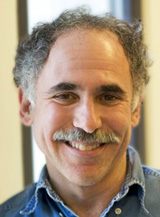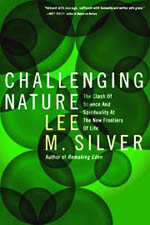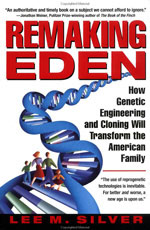|
Challenging Nature
Previous books
Presentations
Publications/Writings
Biography
Princeton teaching
|
Interview:
Us and Them
by Nell Boyce
New Scientist (London)
May 9, 1998
Imagine humans diverging
into two or more species as different from each other as we are
from chimpanzees. That could be the end result of genetic engineering
argues Lee Silver, a biologist at Princeton University, in " Remaking
Eden: Cloning and Beyond in a Brave New World". But for Silver,
human cloning holds no fears, as Nell Boyce discovers.
Your book hinges on the idea that human cloning
will become common, guided by market forces and unhindered by legal
issues. What led you to this conclusion?
The way Americans have used reproductive technologies in the past. For-profit
clinics have popped up around the country that are willing to offer any kind
of services that infertile couples desire, if they are prepared to pay for
them. I don't think that cloning will ever be common, in the same way that
in vitro fertilisation is not common. But I think it will eventually be accepted
and used by a small minority of people in special circumstances.
What about people who say that you should stop cloning with laws ? For example,
Britain has banned human cloning since 1990.
Human cloning will not harm people if couples use it to have children that
they're going to love, and the children are healthy. Many Americans would see
laws banning cloning as irrational, and they would try to get around them,
in the same way that British women come to America right now to buy human eggs
because they can't buy them in Britain.
Your most controversial claim is that genetic engineering will ultimately
lead to two or more human species that would not be able to interbreed. Do
you really believe this ? Why exactly is this going to happen ?
Two species could arise in the distant future. I believe this could happen
because genetic engineering of embryos is inevitable. I can see ways in which
genetic engineering will be made safe and efficient, and there will be a market
for it - parents who want to give their children advantages in life. Already,
the children of people who have money get advantages, environmental advantages
- they get better educations, they get better health services, they get computers
on their desks to play with. The huge gap between the rich and the poor shows
itself in what parents can do for their children. I see that continuing and
becoming more pronounced in the future, and extending into the genetic realm.
I really do believe that genetic enhancements will accumulate over the years,
and that that could inadvertently create humans who could not interbreed.
Do you think parents will deliberately do this to stop their kids sullying
the designer genes they have invested in ?
One can imagine several different ways in which genetic engineering could be
used to initiate speciation on purpose. For example, people could give their
children altered sperm-egg binding molecules to prevent them breeding with
other people. If we look at the worst examples of ethnic conflict that still
plague the Earth, we can surely find examples of people who might do this.
If we allow our minds to roam freely, and take off from the worst of human
instincts, I don't think we can rule out purposeful speciation.
Would it be such a bad thing, to have multiple human species ?
The notion that the upper and the lower classes will become further and further
apart until they separate into different species I think would be the most
horrible thing that ever happened to humanity. It would give those who were
genetically enhanced a rationale for severe discrimination against those who
were not. The enhanced would treat the unenhanced the same way we treat other
species right now. We treat human beings as equals, but we put other highly
intelligent primates, such as chimpanzees and gorillas, into zoos and cages.
With cloning, women will no longer need men to reproduce. What effect will
cloning have on sex as we know it today ? Could we end up with only one sex
?
I doubt it. Most women I know like having sex with men, and I don't think that
will ever change. I think it's important to distinguish the science -fiction
scenarios from reality. The science-fiction scenarios are little armies of
Hitlers running around. But governments are not going to clone people. Governments
do not reproduce. People reproduce, and we have to get back to a basic biological
fact, which is that people want to have children to raise and to love. This
is part of our nature. Governments have never produced children, and I don't
think that they ever will. Is it possible that an all-women society could go
off and establish itself on other worlds ? Yes, but I don't see it happening
on Earth.
How well do you think scientists are addressing the implications of cloning
? Are they being honest with the public ?
There are a lot of scientists who are perplexed by the public outcry, but they
are afraid of public opinion. They don't want to confront this outcry and say: "You
don't know what you're talking about, you're wrong." There could be a
backlash that would make it more difficult for them to conduct their research.
Whether or not they think human cloning is bad, it is easy to condemn it when
a ban would have no effect on their own research.
In your book, you mention that in casual
conversation with people at IVF clinics,
they said they were anxious to move forward
with cloning selected patients. When could
this happen ?
It's going to take some time. Nobody in their right mind would think about
cloning a human being today. I think what those people are doing, quietly,
is trying to get cell fusion to work with human oocytes and somatic cells,
trying to get the initial embryonic divisions to take place, and that's perfectly
legal in the US at this point in time. Ultimately, I think a safe method could
be perfected. But they are going to have to wait for many monkeys to be born
without birth defects before they attempt it in humans.
Your book makes such extraordinary predictions that some people might accuse
you of scaremongering. How do you feel about that ?
I'm not suggesting that the most outrageous things are going to happen tomorrow,
or even during our lifetime. I'm suggesting that they'll happen if we take
the science we know today and just naturally follow it forward. Each individual
use of the technology could be justified by the fact that the parents love
their children and the children are happy and healthy. It's only when the individual
cases are accumulated over many generations that it could have such a dramatic,
unintended, long-term effect.
|
Hover over or click on books to order from Amazon.com
|


